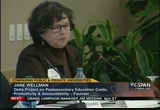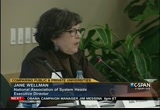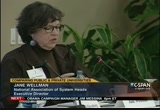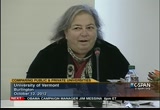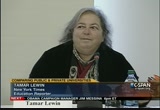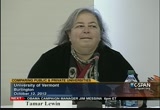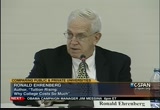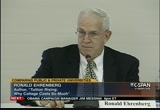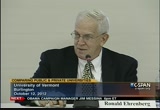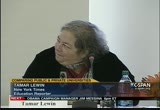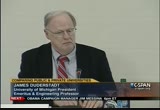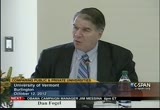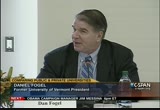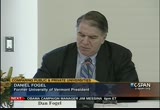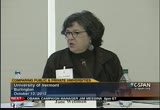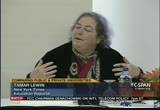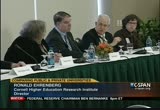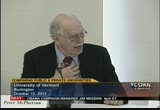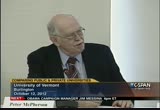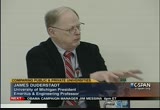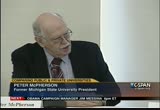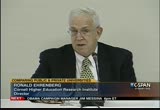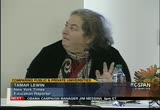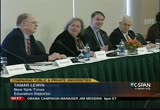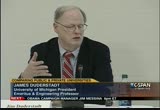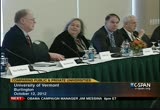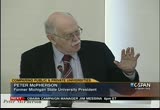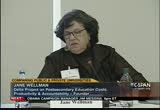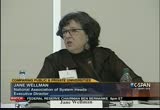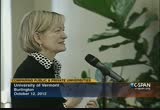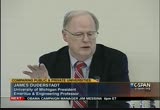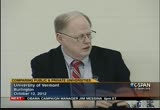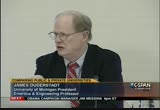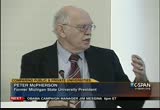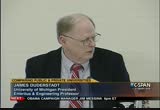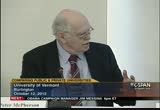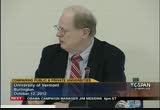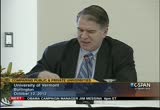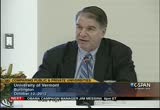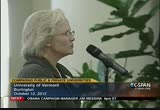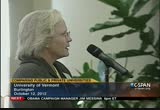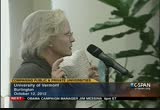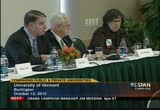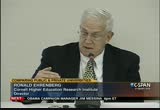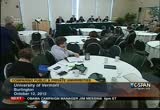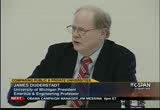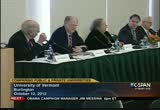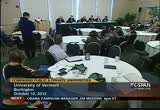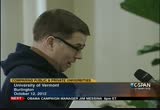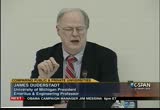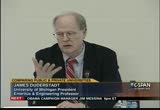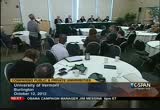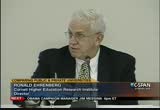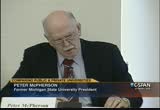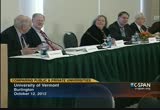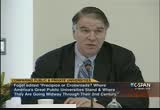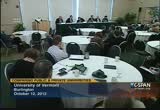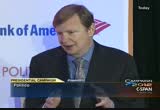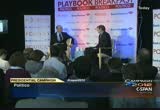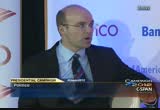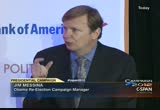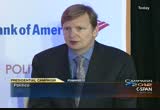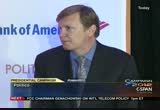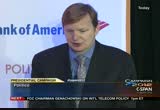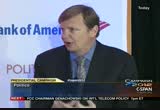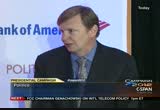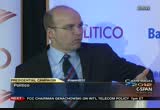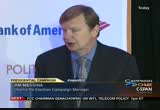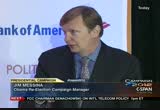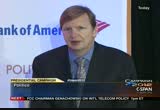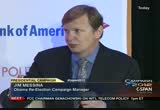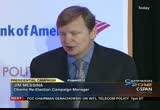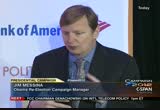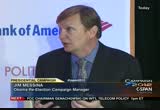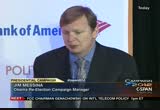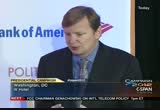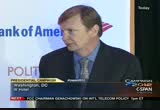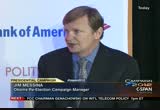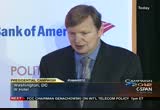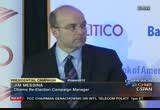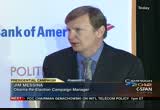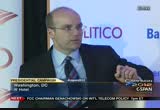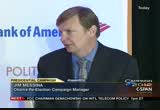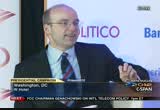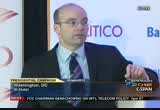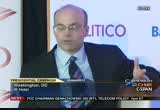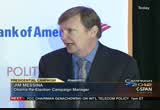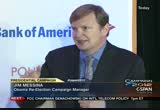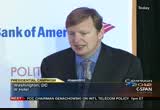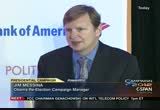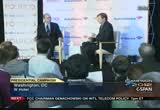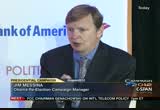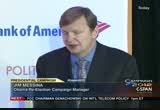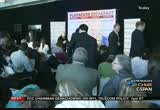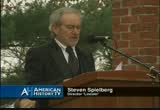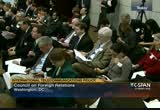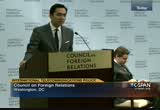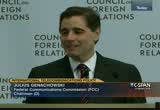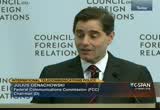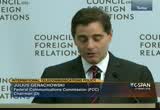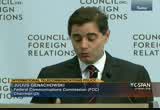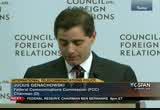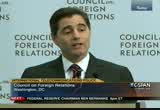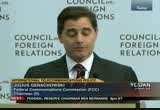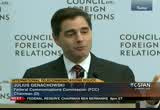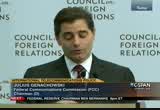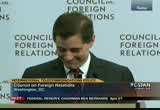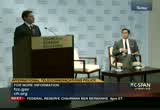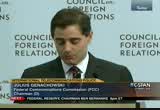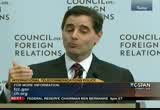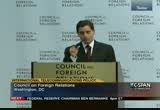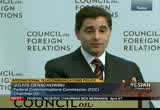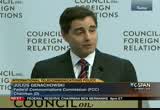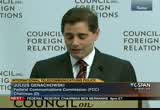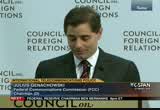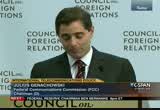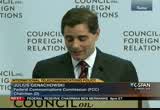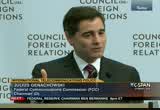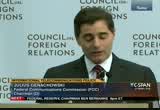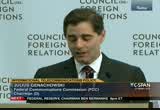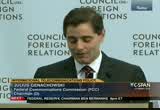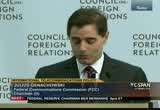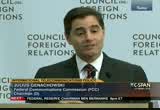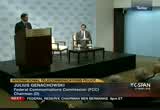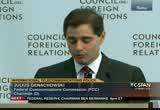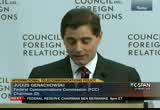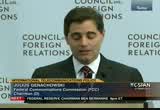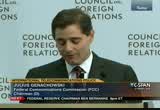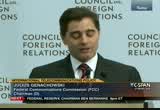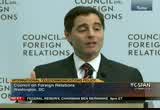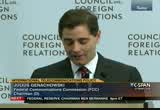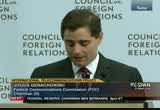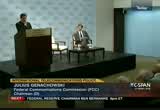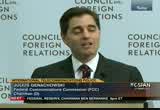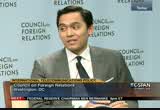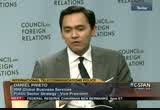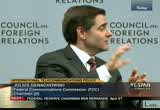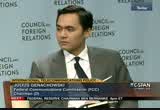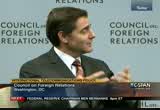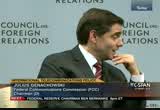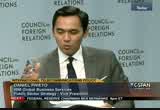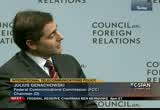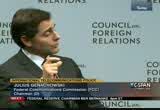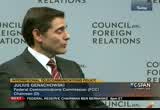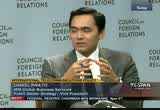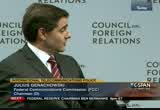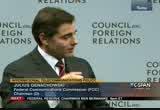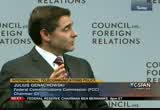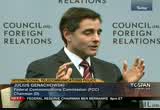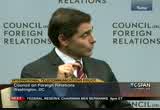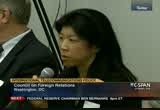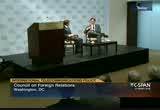tv Public Affairs CSPAN November 20, 2012 5:00pm-8:00pm EST
5:00 pm
necessarily bad, but people. but the reality is that we have the business of who gets into higher education, who is admitted, how they are taught, what counts for a curriculum, what accounts for a credit are increasingly a part of legislation. i worry that, without this being a left/right kind of thing, i do not think a team that should be made at that level of government. a lot of mischief lies down that road if we are not careful about it. i think that the political firewall role of the systems as a bumper between the public and the institution, with particular attention to the centralization of a fiscal decisionmaking where possible, transparency in all
5:01 pm
matters about how work is done, but with essential respect for the delegated role of a faculty and academic policy is critical. i think that we need to be building systems that can do that job. i also think that the -- there is a town here that the government's is worse now than it ever has been. if you look at the literature on governments and the facts on governments over the last half 100 years, it has always been at messy. it has never worked all of that perfectly. whether we are talking about internal government or external governments boards and legislatures. there is a lot of messiness on both sides of those things. i remember my president saying
5:02 pm
-- he came and left the job the same way -- fired with enthusiasm. he was one of the great public university presidents. he fell victim to politics. it happens to the best of them then, it happens to the best of them now. i do think what is different now, this is now the people's business. what we have to be paying attention to now more than i think we did in the past is not just how the institution is managed and what good for the institution, but the connection between the institution and the public needs for it. that means a much more attention to student flow across institutions. much more attention for what is happening to our public school. we cannot have a great research at our public schools are failing. it does not work. we cannot have a great research if we are not getting people
5:03 pm
from community colleges into our institution. the connectedness question is much more important then i think it was 30 years ago. and that requires different tempos, a different focus, and a different focus. >> going from there, talking little bit about affordability financially. this is my third higher education gathering. at all of them, the higher and people are saying, really, we are affordable, this is not a crisis. the media blowing it up with these unrepresentative stories about people who owe $100,000. they are creating a perception. i hear that, but i also know that there is something very not good going on there. during the housing crisis, it was probably 3% of houses that
5:04 pm
got close, but nobody would say there was no housing crisis. i also know that whenever we are right affordability stories, there is this populist outrage. it is a little bit like when i covered abortion. it is that hot because it is so close to the american dream and is this now just getting reserved a for the elite. as we looked at it in a journalism lands, it has seemed to us, and this will probably offend most of you, but to be higher at to touche -- the higher education institutions have not covered themselves in glory. the enrollment and a financial aid of people are not being very strict because they want to enroll people with what the costs are really going to be and what the alternatives might be of coming to their wonderful
5:05 pm
places. what it means to take out a loan and how much is reasonable for a person to borrow. it is true that this is a matter of public choice, really. people have the right to make the choices they want. but i want to hear from you all whether there is more you think the university should be doing without stepping on people's right to send their kids to whatever school they think their kids should go to. is there more you all could and should be doing to help guide those choices and make it less about enrolling everybody in your institution? anybody who wants to talk should. >> i think a lot of the public outrage is what is happening in private higher education, not public. >> not entirely. >> people do not understand that private and public higher
5:06 pm
education are not associated with increase spending but our associate with reduction in state supporters. having said that, and since this is a conference on public universities, we have an obligation to be efficient stewards with the resources that we do get from the states. that means there are all sorts of efforts to try to make sure that the money is promoted primarily to the key academic organizations to reduce our administrative costs. there are a number of large universities that very publicly have done that and our consulting. we have to figure out ways to increase and we reduced the cost of our instructional activities without reducing the quality.
5:07 pm
my own research basically shows that as the shared faculty of an institution -- six years graduation's go down. we cannot do it just by substituting lower priced the people. we have to find ways to improve learning. this is where technology is going to come in. a lot of people can talk more technically than i can about the role of new technologies and an improving education and reducing course. you hear the things as such of the open learning initiative periods -- open learning initiatives. and we have to figure out ways of sharing academic resources
5:08 pm
more across campuses in a system. but also across institutions which are our competitors. every institution cannot afford -- we cannot all cover it. how do we enrich our curriculum? and then, finally, there is the whole issue which you raised this question -- will there eventually be one or two major research university powerhouses that will develop introductory courses? will other institutions buy and then reduce their costs to the universities to help them do the things that they do. >> i definitely want to get back to other ways to do those first two years. i also want to go back to the
5:09 pm
question of a financial aid and what the universities do. we all know that the reason the public tuitions are going up so fast as the lower stage of appropriations. the public knows that the public universities used to be cheap and they're now going up much faster than private. >> it is not an amount. >> but the private system is still expensive. it will catch up. >> [indiscernible] >> that is wrong. >> the gap in dollar terms is frightening. >> it used to be so cheap to go to public university that nobody even thought about this whole thing. was fined. it was so cheap. in the gaming status, publics are still going up very fast. i just want to hear -- there is
5:10 pm
nobody here who would say that the public has not done everything they could to help people understand the cost. it is not cheap to go to public university. >> but it is still -- the principal cost continues to be the cost of living, not the cost of paying for instructions. it is just the opposite of private institutions or that costa several times the cost of living. i think part of the public perception -- misconception falls on people who set the bar by sang the more you spend, the better off you are. whether it is the michigan football team -- whatever. but the reality you were just told is that it is almost as cheap today in terms of instructional costs and spending as it was 20 years ago. ok? >> and community colleges, you could say they are even cheaper.
5:11 pm
so, none of you think that any public research universities that you have done anything with has done anything that wasn't wonderful -- >> that is a distortion. we are not saying that in the least. what we are saying is you have to get the facts right first before you unleash the barack. -- unleashed the miragbarrage. >> one is not always comfortable that one is doing everything in a way that will leave one with the wistful sleep of a newborn baby. particularly, in a situation like ours where we are maintaining access and affordability very aggressively through a very successful high tuition, high strategy for our
5:12 pm
vermont residents. but we are 75%, 76% of our students are coming from out-of- state. it is possible to place critical pressure on the question of the balance of merit and so on for that large population of non resident students who become an institution as we are an institution and served many students from other states and wonder if we have that balance quite right. i will say that we do our best in good faith. to strike that balance, knowing there are moral complexities and policy complexities to the issue. i do want to reinforce what jim just said. our educational costs from a 25-year period from the mid
5:13 pm
1980's have gone up 0.4% one year on a compound annual basis. there are very few enterprises that have contained costs that well. i also agree with ron. we have to do everything we can, not only to manage costs extremely affectively as the report from the national academies calls upon us to do, but also to make sure that the outcomes for our students are as good as they can be. the value proposition has to be at the center of the call so we are steering toward. >> let me try something here. i think that the flash point of public critique about higher education and rising tuition, no
5:14 pm
question about it, we have a very strong positive, still, for higher education. there is a huge vulnerability for concern about rising prices. there's a belief they are going up because we are paying attention to institutional advantage over student and over families. i do not think all of those perceptions are factually driven, but they are the very real. no matter how slice-and-dice the data, prices go up every year. we have to go with a much more straightforward way. distinctions between prices and costs, between tuition and fees, the games we play over tuition policy can contribute to confusion. i think we have a factual problem and a communication
5:15 pm
problem. it is not something we can't take her over. >> if someone were landing from mars and looking at our education system, this was an education editor who said this to me. they are all trying to get each other's out-of-state students because they pay more. that just drives up the cost of education for everybody and lets them take in more money. it is a frustrating to hear, again, we are doing it very well, we are doing it very cheaply, not so much about -- >> this is an unusual situation in the sense that they are not displacing any in-state students. the real problem occurs in states where theremars and lookr education system, this was an education editor who said this to me. they are all trying to get each other's out-of-state students because they pay more. that just drives up are underserved populations and increases dramatically. so is the issue of efforts to
5:16 pm
diversify the student body across international lines. the international students bring neat things to the institutions, but also, they bring more revenue. there are also affected by what we can do. i don't mean to keep bragging, but one of the things we are doing is that we are using the revenue, the extra revenue that we get to provide a funding so the low income students can study abroad. these are important public policy issues. >> we are very sensitive to the fact that we have held our education expenditures across the country at a steady flow and mostly increases of tuition are
5:17 pm
to take up for the drop in per capita students. having said that, with public institutions and public purposes, and there is a perception that we have a problem. that we are not being as response driven. i think less of a perception today and some senses then when we had the cuts and people knew we had cuts. we want to have access. we want to have completion. half we feel deeply we have a public purpose. i think there is more we could do. i think the university of maryland system had an expansion. a lot of people think that is very interesting. i think we should worry about whether or not our students get jobs.
5:18 pm
there is a conversation about how we do that. public universities what public boards are struggling to respond to this. the public concerns and how to reduce costs. more than i have seen ever, in part, because of the recession. we do not want you to go away thinking you are being provocative, i know. thinking that we do not believe deeply in public feud -- public institutions responsibility to respond. >> well, we do, but we also have to report that your percentage increases are much higher. actualdon't you put the dollar amount?
5:19 pm
you do not have the numbers. that is the point. if harvard increases at half the rate of a five times the amount. if that is put out there, who is going to say that harvard is increasing less than michigan. >> i know that we put to both of those. >> as one of the really -- we are very anxious that the public understands that when george washington university and has a $60,000 tuition that that really out fliers -- that should be the public. >> it is true, they are very different. i am sorry, go ahead. >> the other point i am trying to make is that these are public, but they're also state universities.
5:20 pm
they have public obligations to the states. they do maintain the lowest possible costs to students from outside of the state from whom they receive no money from california or from china. they are private institutions. their actual costs are much less than most other private institutions. you have to understand, and i think we tried to explain that we are really only truly publicly financed for our in net-state students and that is where our priorities are. from out of state will provide you with the opportunity to attend, but we are a private institution to you folks. we will try to do our best. >> we need to think about where the u.s. didn't -- where the u.s. student -- we never had a
5:21 pm
conservative actor -- a concerted effort of a ranking system. the report does. it is almost entirely prestige and important. in its judgments as opposed to outcomes. we need to think more about how to deal with this problem. the public university has the system of accountability. but that is not everybody, of course. it's caught some way so we're trying to adjust its. but how to half in place incentives systems to focus on outputs is a big deal.
5:22 pm
during the brief period of time, i joined with the presidents at columbia and stanford. he understood exactly how distorted that rating system was. but then several days later the people told him how much that issue generated in terms of profits and if he wanted to stay its editor, he better leave it alone. >> here again, the role of the president comes in. he was very disturbed because the u.s. rankings were falling. day asked him to go out and drum up more applicants so the universe would look more selective. he said to them, i'm not going to go to rural areas of wisconsin of the poorest schools where children have no chance of getting estimate -- into my
5:23 pm
institution and mislead them to read because he was able to educate the board on the social role of the institution and that was more important than prestige. even in private universities you have that problem. when he was first president of cornell, it seemed like the activity was going down to the competitors but there were getting better at a slower rate than competitors. his reply was, how selective you have to be to be a prestigious university? the next year when he saw the number of pell grant recipients fell, we went through a wall. he convinced the board it was important to do that during the worst education -- economic decline. the key role of the president in making clear to the board what fundamental objectives of the
5:24 pm
university should be. >> those are good stories. there is also the president of a well-recorded university in a state going very fast so it cannot serve everybody whose contract gave him more money if he got into the top 10 public research universities on the world report. who is in the competition for more merit scholars from out of state. has an honor student college set mostly serves the out of staters. there are bad stories. those are the ones -- and similarly, on the west coast, when you have arizona and california and washington all competing because there is not enough space in states, is is really problematic. when i was out there on some version of this, there chinese students are out, i think 10%.
5:25 pm
there is more chinese students then from elsewhere in the united states. i was talking to their relatively-a new president and could they have a new system where the american students not from washington paid more than the in-state students, but substantially less in the foreign students. he said, there might be some support for that, because after all, we are getting a fair amount of national funding one way or another. but, of course, that are private to the out-of-state people. there is also a national obligation about how we are going to educate the most people most chiefly. >> my return to that for a moment. in the national academy report and recommendations there were making to committees, states, and businesses and universities, we rackham -- we recognized that the number one concern of the american public
5:26 pm
was the perception of costs were not being adequately controlled. and we believed very strongly that universities actually have to demonstrate through achievement that pathway to control. we essentially asked them to take the pledge for the next decade. they would hold the cost for ongoing activities. by the inflation rate, we did not mean the higher education which would mean for most institutions we are challenging them to trim 1%, 1.5%, of their budget. interestingly enough, even with , weral the late president's had unanimous support for that recommendation. my sense is that many of the public's are being forced to do that anyway.
5:27 pm
that will give an enormous in digestion to the richest of the privates because they compete by outspending people. it will rain some of that in. but the other part of that that peter pointed out, we right now to not have the financial tools to strategically and manage our activity so we can achieve that. this challenge will force us not only to take steps, but to develop the capability to control those costs. >> the 500 universities released last tuesday contained a commitment that we would increase degrees by a certain amount as a group. it also said that we will constrain education. and a lot of discussion as to
5:28 pm
whether we should have made that tied to inflation and how we should do it. some states for costs had been cut so deeply, it did not seem the appropriate thing to do. we have been able to keep, as a group, expansion for education flat for 20 years. we all know we are under huge pressure to keep it there. i think we will be able to contain these education -- the question you're asking is should we do more? i think we should do more. i believe some of the web education tools, i believe there is some money to save their. i think we to work on these things and, frankly, there is a bunch of data about ourselves.
5:29 pm
>> we have not hit much on technology and i would love to hear questions on those and what people think. >> if we can, much of this conversation because of the nature of the audience, it is about public research universities. i just wanted to bring into the conversation the picture affecting state funding and tuition for comprehensive universities and community colleges who are, i think, even more dependent on state researches and universities. a less able in light of budget cuts and historically received
5:30 pm
much lower appropriation levels for good reasons. nonetheless, they would kill to have your budget now. as we talk about where the problems are, and where we are either going to make or break this agenda, we will not be able to do it exclusively or predominantly. a state commitment to the access institution. i think the institutions have a public leadership role even if it is not all to be done on their watch. >> from the university of vermont. while i have been at this conference, i have also been
5:31 pm
participating in the education of via the web. my job at the university is to handle the outreach. i am sort of a canary in a coal mine. i have more of a sense of urgency than possibly the rest of you. what i notice is have you heard about you? city? -- udacity? universities will now contract with stamford to buy courses. i was just curious what you think that will mean for the future -- courses and degrees, and eventually. what that means for the rest of us? >> there's a lot of movement in that direction. are we in it 10 years of going to have our first two years?
5:32 pm
>> we are starting to see that already. >> gateway courses. >> let me comment on that. for monday and tuesday i chaired a major workshop bringing in the top people who were involved in this as well as a number of other leaders in this area. what i sense is, this is still very early with these massive online courses. the principal interest in them is not serving a huge number of people around the world are making money. the principal interest is as an experimental tool to understand how learning occurs because using so-called analytics, data mining, you are able to understand how students were taking certain types of materials are digesting and how
5:33 pm
they're performing. there is a lot of talk about is this simply a glorified textbook? ok. it is certainly not the kind of vegetation we would think of as a college education, meaning on campus with a working committees and the broader experience. but there are certain aspects of learning that occurs. there are other formats. this is an artificial intelligence base situation. if the cut and some other groups have done the gold standard groups on this and have found you can learn twice as deep, twice as fast in certain areas. this is deeply immersive gaming,
5:34 pm
once again, expanding very rapidly. the learning process is significantly different with these than what you see on college campuses. they're highly interactive where they learn more from students. it is stimulating a very deep understanding of modern science. enormous potential, but whether this is a college education are not is very much in doubt. >> i guess that is my question. i also noticed when i was listening to this, they are now going to ban it sort. they're going to look at who are the best students and contract with private industry and connect those students to the industry. >> i think what is, among other
5:35 pm
things, exciting is where it may lead to, but more practically and immediately, it is giving credibility -- credibility we probably should have had anyway. it was talked about yesterday. again, working with other stuff. what virginia tech is doing. teaching no calculus except through a self educated course and driving down costs and increasing a learning outcome. so much of the first year in college is the gateway courses.
5:36 pm
there is enormous opportunity, not just to reduce the cost, but also increase of learning. >> except for the fact that the first and second year of a college education is really designed to help kids grow up. i do not think you'll see the real impact of these courses in adult education. of course, that is where the explosion -- if it is estimated by the year 2013 there will be over half a million people enrolled in higher education and almost all will be adults. there will not be 18-22 year olds. >> i hope you are not right about that. i hope you're right about adult education, but i think we need to teach things like that first- year calculus in that way. that to biology, chemistry, physics, and some say more.
5:37 pm
if you can get higher learning outcomes out of a first-your calculus course, how do not do it. and what i love about the rest of it is that now you have stanford and mit and the rest of places you can think about the sorts of things. why shouldn't everybody else? even though the connection may not be -- absolutely. >> a real connection between udacity, is they are involving people who went to graduate school together in computer science at stanford. that is how these spinoffs
5:38 pm
occurred. these are very affective and being used to design things like advanced programming. we're now experimenting with putting out courses and social sciences and so forth. those are important experiments to run, but i think the big impact of this is that it stimulated some very serious and very strategic looking thematic departures from the classroom. >> i cannot name you a major public university that is not thinking about this. there probably are some, but i do not know them. these outcomes and the these costs questions are really quite compelling. if nothing else, the idea that we can get better learning outcomes and we know what they are. it isn't that you just have to
5:39 pm
be in calculus. it is said to know what concepts of calculus you have mastered. >> i know we would like to turn to the microphone and we will in one second. i just have to say, i agree with peter, but i also think we should not lose sight of what is special about getting an undergraduate education. we are talking about a particular kind of institution. if we can use the online learning initiative rich the feedback loop to an instructor in a hybrid course, that we are still bringing students into contact with the faculty and who they will become engaged with. one of my favorite conversations with a first-year undergraduate is what i said to her, what are you major in?
5:40 pm
and she said, and majoring in biology, but i am rising an article on a gene in colon cancer. the next time i saw her, i said, what happened to that? she said it was published. a first-year undergraduate and that does not happen if you are only online. you can become more proficient with improved learning outcomes with the online resources, but you want to have those students studying the sides of the masters in the university. >> i would say that i could not agree more. this higher ability, is going to force us to more clearly understand what you just said
5:41 pm
about this undergraduate experience. there has been a bundle of concepts that we sort of a field. how can we be sure we've got it. not everybody will be able to afford it, either. it certainly is part of going to the university of vermont. >> let's go to our questions. >> this is fascinating. i'm a little worry about changing the subject. i want to thank you everybody. as the narrow pleasure being here. i worked with a number of people. many of the people here have been our clients and tablets and searches of the past. listening to all the change that has taken place in higher education.
5:42 pm
if we're to except the suggestion that managing change is a short-term joppa, if we are also to listen to some of the characterizations of being a president as often thankless and or risky, i talked with the chancellor recently who said that you can only watch so many people go into the middle of the road and to stand there and get hit by the same bus over and over again and realized, i am not going to do that. i am grateful that dann said there is joy in these jobs and there is a reason to do it. it is is a very compelling commission. let's use another metaphor and tugboats and buses and roads. i am thinking of baseball. you have a pitcher who manages the game of to a certain point.
5:43 pm
those tend to be short-term positions. and then i am wondering what happens after that and higher education. what sort of leadership do we need post-change. where are those people now? where are they getting their training and mentoring. i venture to guess that none of you knew or could foresee the amount of change we are facing right now and probably did not train for this. that is my question. where are they going to come from and what sort of leaders to me. i think we are now -- >> i think we're now part of much of the rest of the economy in the world for changes perpetual.
5:44 pm
i think they are wonderful jobs in some anyways, but they are very hard jobs. they need to have the intellectual, emotional capacity for perpetual struggle and change. >> i think the issue of identifying the next generation of leadership is a huge one. i worry about it in public and private institutions as a generality. i think we are over administered and under managed. i don't think we have a culture of thinking about the development of talent that long history is not respecting -- respect is the wrong word. we recruit people for the scholarship and fund-raising abilities. not necessarily because they know how to manage these institutions.
5:45 pm
but i think there is a lot of idealism on the academy. i think people see these jobs as an opportunity to do something important. they see them as an opportunity to make a difference. i think that is all true. we will likely to -- we will to attract more talented people. so they do not have to stumble into their own version of figuring out where their finances are. those kinds of things can be taught and more should be done on that. >> is is sort of interesting that it used to be the only way you got to be president of the research university is if you had already been a university president of another institution. what we are saying now is that
5:46 pm
there are some money vacancies and so much turnover that we are looking in different places and down in the pool. it is a very interesting example. doing this ine your practice, you're looking for people who have demonstrated ability and to think and grow in the job. given the fact as we talked about this position, there now are many people who will jump and move from a dean at ship position almost directly into the presidency. the real danger is that you need to have experience working with boards. if you do not have experience working with boards, you flame out quickly.
5:47 pm
i think that is what happened to jeff lehman at cornell. i think that universities have to mentor their new leaders. >> we need a board a boot camp. what do you think? >> not so much. >> you look at all the flame out. just about all of them are related to boards. >> there are issues about board president relationships and improving math. just the notion of doing things like making sure president goes to the harvard institute for making sure you are assigned a senior adviser. -- was often hired as a consultant when a new president came in. he would be a mentor the
5:48 pm
president could turn to. we have to worry about how do we support our presidents? don't just assume that he or she is ok. >> let me suggest a business line for you. as the chair of nomination and governance board, is for succession planning. you always have to be thinking, what is that ceo sitting at the end of the table gets hit by a truck an hour later? there are companies such as yours that are very experienced and how to launch a successful planning activity. how to it identify successful candidates from within the organization and duty to have that road map. universities and to not pay much attention to that, but i think this is a new area of you folks
5:49 pm
need to move into. >> in a fortune 500 corp., if you do not have at least one or preferably a couple people who are possible candidates in case of an immediate need, the board generally thinks it is not doing its job. but but we here in vermont, you have this wonderful success and a wonderful outside person to be president. in a corporation, to have two outsiders come in and the president would be regarded as a board failure. and it doesn't. and yet, this is the way we uniformly to it. we do not have the status to be the president of great places unless we came from someplace else.
5:50 pm
go to're a chef, someplace else to be president. it doesn't make sense. it is based on an antiquated concept of what the role of a president is. i would think one of the best things we could do was begin to adopt the other sectors that you're supposed to have people trained and ready and then you can begin to have this in turn of people have a relationship with the board. >> let's try to take one and maybe two more questions. i would like to go back to the online learning question. assuming there are 50, 100 students per class, which generate significant tuition revenues of relative to the cost of the instructor. as higher-ed cannibalizes those
5:51 pm
courses. what are you going to use to supplement those courses on the higher end where i have very expensive professors who teach private students and where the cost per instruction hour or however you define it means that class is losing money every single time you teach it. i think that is something we're all very excited about technology, but it seems as though if i look at public and private institutions that you all are moving over a cliff financially where you are cannibalizing your main revenue streams in terms of instruction hours and going to outsource that. that will be wonderful in stamford and all these other mit places, though where is your next revenue stream coming from?
5:52 pm
>> we're going to charge for it. one of my colleagues who is the father of this technology describes the in competencies' of the university. the capacity to make significant learning communities. people do not learn as much as individuals. second, to provide access to knowledge and resources -- libraries, laboratories, groups. third, to essentially certify that this is close to truth and this is false and provide a piece of paper that testifies that you have learned something. these are the three competencies'. that is what people pay for. the way learning communities are formed, they are leaving the classroom. students learn more from one another than they do from the faculty. but now those groups may extend
5:53 pm
through to the world. that is changing. access to knowledge, in michigan, everything has been digitized. in a million books in the basin of the library and no one checks the matter anymore. that has changed. the fundamental role of assessing the learning that has occurred for that knowledge that is appropriate, that is changing as well. the functions are kind of the same. zones have hemans value. it will generate resources. >> i've a slightly different answer. i don't disagree with it. but my answer to your question is, good point. outink we haven't figured the cost structures of the institutions. we haven't figured out what the right balance is on a lower
5:54 pm
division courses in particular. there is a lot that has to be sorted through. i think we are a long ways from being able to answer your question. >> it is a great question, but it is also true that institutions that are afraid of taking advantage of higher quality and low costs going fist forever. >> let's have a short question, i hope. i question about prestige and the ranking. it seems like there is a lot of agreements among the panelists that rankings are, shall we say, flawed, and not based on outcomes. and yet, universities widely promoted the fact that they gained standing in those rankings. sometimes, you use those as a goal. does that make anybody uncomfortable? because the center that lend credibility to such rankings?
5:55 pm
are we just talk with the fact or is there another approach? >> i think if you look at the web page of any university, what you will see on the web page is what ever -- whenever favorable publicity university is getting. i have done research that shows you can fall into the ranks of all sorts of bad things. it is more difficult to get the students to come. you have to get more financial aid. tests scoring for students go down. the rankings and do matter. people say they do not pay attention to them, but that is that the only thing they are paying attention to. i think the message is that you can convey on your web pages and your written documentation what are the things that you are proud of and hopefully public research universities will deemphasized the rankings which
5:56 pm
have nothing to do with educational research anyway. >> i think there is no question that to end the institution, there is a cost to not paying attention to the rankings. people do respond to incentives. we tried to say we are not going to, but they are there. i think that individual schools complained about these rankings have no impact on the u.s. world news report. and, of course, sometimes tunes -- sometimes the institution is. i think as a community, we either need to, together, either create our own option to effectively complain or go down with the media. this is such a societal problem.
5:57 pm
it is creating a misallocation of resources and we ought to call it for what it is. there is this -- there is some instinet -- there is some inconsistencies here that have gone too long. >> it is a great question. we always complain, we have not done anything about it. individual rates, you are powerless, too and how, more broadly, this is done with the media pointing out to counter productivity of these rankings. >> thank you, all, panel. >> i want to thank everybody for
5:58 pm
having participated. we had a very rich group. it has changed from hour to hour. the participation has been wonderful. these are pressing, pressing issues for the well-being not only for our institutions, but i believe that as he so often says, universities like university of michigan have global reach and global constituencies and what happens to our great public research universities in america has consequences for the world at large, not just for the united states. i want to thank everyone for having deeply informed, really,
5:59 pm
model journalists who are saturated in our industry and have been able to challenge and provoke us and has, i think, and greatly enhanced the value of our proceedings. thank you for doing this for us and to all of the panelists and keynote speakers, too, a heartfelt thanks. thank you, everybody. for those of you dashing for the 1:00 hour flights, the shuttle bus should be outside the main entrance of the davis center. we will run it back around or i will give you a lift if you need it. if you are going back to the hotel -- [laughter] [captioning performed by national captioning institute] [captions copyright national cable satellite corp. 2012] our prime- time lineup. chairman ben bernanke gives his economic outlook for the event
6:00 pm
in new york city. obama bragger first discuss his evolution as president and on c- span 3, the challenges and threats facing the u.s. government work force. that is all tonight on the c- span networks beginning at 8:00 p.m. eastern. >> the average new facebook user is in indonesia or brazil right now. they are using a mobile phone to access facebook because they have not had access to a broad band laptop for pc. in a lot of cases, there is not infrastructure like you have in the u.s. a lot of americans will say facebook is great for gossiping and sing with my friends are eaten for lunch. but if you were talked to somebody in the middle east, you would hear a different story, facebook was providing access to
6:01 pm
news, people that had unique access to information they were not able to get otherwise and you get a much more meaty story about what facebook means to them. >> more from chris cox, thanksgiving day on c-span. just after 12:30 p.m. eastern. john roberts and a look into the supreme court. and later, space pioneers and nasa officials pay homage to the first man to walk on the moon. next, remarks from president obama's reelection campaign manager jim messina. he spoke at an event this morning looking at issues related to the 2012 campaign. this is one hour. >> you have been in montana. >> yes, drinking beer. >> what else did you do? >> i watched football, saw some
6:02 pm
friends, i did an amazing thing called sleeping. i have never done before. it was great. and then i'm going back tomorrow. for thanksgiving and then we leave for a month in italy on saturday. >> they love you on battleground radio but this is the first time you have done an on-camera interview. >> it seems like a bad idea at the time. look, we had amazing on their people -- on air people. my language did not seem to fit for television during the campaign. >> let's plan gen. when did this race become unwinnable for mitt romney? >> i am not sure when that moment was. when i thought we were going to win was a few days before when
6:03 pm
the early voting numbers look good for us. >> you thought it long before the election. i know that. [laughter] >> but i was pretty sure -- >> how long? could he have one after the first debate or where the forces in motion? >> sure, absolutely he could have one. -- won. it was competitive the entire way. i think governor romney could have one up until the end. i always believe in the fundamental truth, we were building the best grass roots campaign in modern political history. we had the best candidate and the best message. >> in a way, the story of this election is the degree to which replicated the 2008 results. many people thought that 2008 was a once-in-a-lifetime result. you came very close to
6:04 pm
replicating it. i think the most fascinating statistic is african-americans in ohio, 11% of the electorate, 15% this time. you found 200,000 more african- american voters who turned out for you. mitt romney lost the state by 103,000. that was the election, right there. finding those extra african american voters. >> let me back up. we won this election because of barack obama. people volunteered and supported the president because of his message, because of the campaign he built. and because they were making big choice about where they wanted the country to go. from the first day, he offered me this job, he said to me this has to be about the grass roots. we are going to run a campaign about the grass roots. that is how we got the numbers that of a bunch of people spend
6:05 pm
spent 18 months telling me we could not to. we give more people a chance to get involved, do very well in early voting and on election day. results show that we build the kind of campaign that made people want to volunteer and made people want to support the president. >> you started early on registering voters. how important was that? >> huge. we learn from the shellacking we took in 2010 a valuable lesson. to many democrats thought they could put obama's picture on a piece of literature. it does not work like that. we have to run a sustained operation to have an ongoing conversation about why they should support the president. we did that. we had eight the subsections to target some of our
6:06 pm
constituencies, democrats, youth, women, minorities. we spent a lot of time messaging to them. you talk about a barbershop campaign, we had a nail salon campaign to get people to register. we registered 1.8 million people. 1.1 million people online. you do not do that if you are not where people are. we build a campaign that was about meeting people on the doors. >> tell us about targeted sharing. >> that was a hard and long effort to build software that had a simple concept -- in 2008 we had two campaigns. a door knocking campaign that with sophisticated and an online thing that in many ways we did not control. will.i.am happened outside of us. those things did not come
6:07 pm
together. we spent a year trying to build pieces of software that allowed all of our different pieces to talk to each other through this thing called-board. -- dashboard. it said, very simply, we will build software that allows you to organize wherever you are. if you want to organize at 3:00 in the morning, you can do that. if you want to put your data into a database, you can do that. we are going to track every metric in this campaign and it is not going to be in one place. then we said, how do we use this, how we use jim messina to reach out to his world? our research showed that the single most persuasive person in an undecided voter's life was their friends and family. this is very different than the traditional way of getting a
6:08 pm
lesson or getting an application with a list of addresses and their voting history in knocking on the door. this is talking to people that i know through facebook. >> yes, what targets sharing was, and it is one of the most important things we did, an application that allowed you to go and the match your world with our list. click here to send them a piece of content, send them a sheet, ask them to support the president. it sounds like an easy concept. it is not. it is hard to do. it took a year of amazing work of our talented technology team. we were able to contact over 5 million people directly through their facebook world. people they knew. they are going to look if there friend send them something. they know that person. >> what was the likelihood i would do it?
6:09 pm
>> over half of the people we ask did it. of those people, 50%, they followed all the way in through to make sure their friends did something. >> looking at how you won, you can argue that campaigns will never be run the same way again. in the specific area, how is that going to change how a sophisticated campaign will run? >> what we learned is you can build analytics to use your time more wisely. it all comes back to the candidate. having people wanting to volunteer. we had all that stuff because people support a barack obama. in the future, actually, in many ways it is a return to the past. door knocking is going to be more important.
6:10 pm
the fusion of american media makes it harder to get your message out. there is so much television, citizens united created this cacophony of television in the final months of the campaign. people got so much of it, a simple door knocker from a neighbor mattered more than anything else to say, let me tell you why i am supporting barack obama. i live down the street. let me talk about an issue you care about. that became incredibly important. >> your volunteers spent less time doing what than 2008? >> knocking on doors of people who end -- or never persuade a bowl. the best example was a friend of mine was door knocking before the election. he called and said that me tell you a story about why you are running a smart campaign. i was told to knock on two doors. one was to chase an absentee ballot.
6:11 pm
the second one was announced the -- and decided voters. i had a great conversation. i am pretty sure that person is going to vote for us on election day. that is honoring volunteers and saying to the contact, you will matter to us. i think it allowed us to hit more doors and more effective or is that the romney campaign. >> how did the data play in your wind? >> in the past two weeks, it has been a little bit overplayed. it goes back to the president and his message. we built an army but when you're building that army, you have this thing called beta. data allows you to do one thing -- use your time and money more wisely. we used data for everything. trying to figure out using our time wisely. >> what is an example of that?
6:12 pm
>> whether or not people were going to volunteer for the campaign. everyone in this room has done calls to ask people to come out to the phone. remodeled every person who is for about the president about whether they would volunteer. you're forced -- first call -- >> history, what we know about you. we got a lot of data and you're giving history, everything we knew about that allow us to figure out whether you were going to volunteer. we knew whether people were going to be a better direct to mail a giver or online. he did a test -- we did a test with a piece of mail, we did have the old way, direct mail, and half using our data analytics. both sides were convinced they were right.
6:13 pm
data analytics a report by 14%. that allows us to use our data better. >> there have been stories about sarah jessica parker fund- raising. seven versions of the e-mail, she mentioned she was a mom or that and an wintour was going to be there. -- anna wintour was going to be there. >> every e-mail had already been tested a variety of ways. our team, are ridiculously talented team. >> what worked and what was a dog? >> willis had tests. they love giving me a little grief and testing against everyone. george clooney completely thrash to me. ashed me.
6:14 pm
>> tell us what you learn from the george clooney dinner with the president. >> at his home. >> and it was a lottery to get a spot. how much did you raise from that? >> we ended up doing on that event a little bit over $13 million. between the actual eve and then the online component. >> what was at about the e-mail, what was the perfect storm that every campaign tried to copy. ? >> with clooney, you can see all the women nodding. there was no analytics there. first of all, dinner with obama was the most successful program we had in 2008 and 2012. it goes back to the canada. people say to me all the time,
6:15 pm
can this be replicated? no. the campaign cannot because it revolves around a bunch of people, whether you like the president or not, you have to add that that a lot of americans are motivated by his candidacy and people wanted to sign up and be part of things like dinner with obama because they supported him. >> tell us what works and the mellon what does not. >> that is a hard question to answer. what works is direct connection to people. offering them something -- we learned offering a chance to be with the president, a chance to be part of history, a chance to sit down and break bread and have a discussion with the president. >> what about the format -- >> a huge difference. where you put the button, -- >> what phrases work? >> colom have dinner with barack obama worked pretty well. -- come have dinner with barack
6:16 pm
obama worked pretty well. people want to care about your guide. >> what was the most helpful analytic tool you had this time that he did not have in 2008? >> i think targeted sharing was incredibly important to us. i think we modeled better. we build support scores for every voter on whether or not they were going to support the president. >> what would that have included? commercial databases? >> that is overrated. the stuff we knew after five years, whether you slammed the door in our face, how you voted, how many primaries, things most people had allowed us to -- we went to an everyday ensample people to see whether or not our
6:17 pm
model was right. and how people were going to vote was within 1%. our modeling predicted our final vote in florida within 0.2%. >> you are confident in your data because of the redundancy you had. tell us about the date you got every night. >> i hope we get into my feelings on american polling, especially the public wants, we decided to go deep. we had an hour and alex team and do several thousand calls -- >> describe that. >> it was a department they used to data across the campaign to make everyone's job better. we had over 60 full-time analytics people. every night they would do thousands of random sample calls. every night i had to look in all
6:18 pm
of the battleground states and every night they would run, a 66,000 bottles of the campaign. >> that has been said before. what does that mean? >> we built a model similar to run the campaign over and over and over. it gives us a likelihood of caring that state. that allows our media team to spend money wiser in the battleground state. it means you run that many simulations to get a statistically relevant sample to make sure the data was right. every night they did that. then we had our talented pollster. then we had state posters. each had a different one.
6:19 pm
we really had three books at the electorate. that allowed me to, to have a look at how we were doing, where we were moving. which is why i knew most of the public polls were ridiculous. >> so, what do you think about public polls? [laughter] >> look, a bunch of polling is broken in the country. it is not for anyone's malevolence. cellphone usage has changed the industry. people like getting under 10% response rates. gallup has been wrong repeatedly for a very long time. only in one election in the past six has it been right. 10 days out they had us losing the final day. everybody tried to get close. another one announced they were
6:20 pm
no longer going to pull in florida or virginia because the president could not win. how can you say that? nobody -- >> which is most accurate? >> can i have another question? >> we have a twitter question. where do you draw the line with data durbin campaigning? are their privacy issues? >> absolutely. we had 18 inside of our campaign that tested our privacy policy. the president believes in this. the new york times reported that if you went to obama for america, you would get a cookie if you went to way porn website. >> that is not true. >> it was on the front page of "the new york times."
6:21 pm
>> ok. [laughter] >> what about my surfing would have been relevant to you? >> most of that stuff is not true. the best data was things we collected at the doors. there was some commercial stuff that every campaign purchased. the truth is the more we learn about data, the more we learn how imports and the connection was. the door knocking, having a real conversation, that mattered. >> what happens to the database now? >> we went out and survey the our entire world and said to them, what are you going to do? what happens to us? people want to be involved in supporting the president. how about looks is a discussion we need to have. he cannot run two campaigns and
6:22 pm
then say we're going to do it from d.c. that is not how it is going to work. what is going to happen is our people are going to get to make some decisions. we will go through a process where we sit down with them and part of the thing we did in the 2012 campaign was have a series of town halls online to say what kind of campaign to you want to run? that is why we did things i did not want to do like it involved in local elections in wisconsin because our people wanted to. we're going to learn from them. >> what are the mechanics? this was an e-mail from you. asking people -- how many hours per week i might volunteer for the obama organization.
6:23 pm
what is it now? will there be something in chicago? >> we do not know. the thing people said to me since the election, and the president talked about this, it will take all of us. whether you voted for him or if you did not to come together and tackle the challenges of this country. people spent five years winning two elections together. they are not going to walk away and become the change they want to see. >> is it possible obama for america will remain in chicago? >> i think anything is possible. what is true, the campaign needs to shut down. we have to figure out what we do
6:24 pm
next. that is the conversation we are having. >> there is an organization that could continue to exist. >> it could, in theory. >> you have this amazing infrastructure, why not institutionalize it and make it a permanent organization ready for the candidates? for the next nominee? >> some of it will live on. the tools we build, all of those things, i hope every campaign uses. i hope it becomes important. the important thing to note is, you cannot give this to the next candidate for president. this organization was built for people that supported this and who were involved. we had over 32,000 liters to volunteer full time. those people were involved
6:25 pm
because of positions of president of. we learned this to our own surprise, you cannot handed to the next candidate. >> would you sell access to target sharing to any democrat? >> i do not think you sell. we are now calling to get in the business of selling things. there are many ways to do that. what we want to do is have a discussion about it. they are the people who know how to do that. what they want to use them on now is to continue to help the president advocate for his agenda. >> how will that work? >> you could easily see people using it to say, ok, i want to talk about the choices in front of us on the fiscal cliff and organize my friends.
6:26 pm
it would be easy to start a group in the last couple of months. it would be easy to go and ask people to call members of congress. that would be easy and i am sure you will see our supporters do that. >> the legacy for obama for america will be an organization that will use these tools, use your database, use your supporters to advocate for the president? >> i think that everybody needs to work together to tackle some of these challenges. of course obama supporters are going to be involved. i will be one of those volunteering. >> what happens to the day that? >> i am going to go to italy. the one thing i know is that i want to be involved in some way
6:27 pm
helping this president. that is what i will do. here is the truth. i have taken a 1 week vacation in five years. it is time to restore my energy. the president and i were joking about how bad i looked. it is time to take a vacation. >> what did you say about how he looks? >> i said i thought he looked great. >> as a possible you will go into the white house? >> i have done that. i back to work on health care. i think my future is probably outside the white house helping him becoming part of whatever happens to our social movement to advocate for his agenda. >> it is up -- possible you would run about love for america on the outside. >> what we have to do first is have a discussion about what our
6:28 pm
people want to do. >> what is the horizon for making decisions about that? >> you will see us make decisions by the and not grow. that is natural. that is what we did last time. last time everybody thought we were going to do one thing. i do not think on election day we expect it to do that but we had discussions with our people and ended up doing that. it is clear healthcare would not have passed without that decision. >> the amazing thing the obama campaign has done, you were the first presidential be like to get 50% of the vote twice. and you did it in different ways. tell me what steven spielberg told you about that. >> when i left, i did a tour of the country to talk to people. the truth is, the world had
6:29 pm
changed since 2008. all of those things have changed drastically. i went to see a lot of people and steven spielberg said to me, you have to blow up the 2008 campaign. you are on the the 1965 rolling stones once and then you charge too much for your ticket. it was an interesting way to think about that campaign. i said to the president i need you to promise me it is not going to be 2008 again. he said, what are you talking about? we've won. i said if we run the same campaign, i think we will get beat. we need a new campaign because of technology. he said to me, ok, but as to be about the grass roots. >> and you have to win.
6:30 pm
>> so we -- he made the single most important scission to put us in chicago. i think that was a crucial moment. >> there was debate about this. some people worried if there was a natural split between the west wing and the campaign, why did it work? >> because you had a bunch of committed people who spent all day, every day, sitting in an open space in chicago, almost no offices, and built a brand new campaign. the reason i knew it was going to work was in on august of 20 11, -- 2011, somebody said is there's something happening in d.c. these days? what is happening? we were focused on building. we did not have you poking and
6:31 pm
prodding us. we were able to spend a year building a whole bunch of things becoming helpful on the ground. we were able to spend 15 hours a day, every day, building a grass-roots campaign. >> how many people were in the building? >> 650 in july. then we started people -- putting people in the battleground states. >> what was the most you had on payroll? >> a little bit over 4000. in october. >> and, did you -- can you imagine another campaign being that size? or is that what a campaign looks like? >> i think whoever has my job to
6:32 pm
blow it up and build their own campaign. everything is going to change again in four years. i think they should do what we did and spend a lot of time trying to dream their own dream. >> what is the smartest thing and the dumbest thing that the romney campaign did? >> the smartest thing, that is a great question. [laughter] i did not mean that snidely. i thought they were amazing fund-raisers. >> what, specifically -- >> more maxed out money, more maxed out checks. >> what did you learn from that? later, they got their checks earlier and you got your as a leader in the cycle. was that planning or necessity? >> we had a better model.
6:33 pm
our average contribution was $47. that has most of your money at the rnc or dnc, and that is a problem because you want to spend your money. our fund-raising allow us to do everything inside which allow us to spend our money on the ground. the majority of their money was at the rnc because they were raising $30,000 checks. >> what is a blunder, something that was costly to them? >> the jeep ad. that was the biggest one. they spent the last 14 days of the election on the defense. day after day they had to answer for that. it put them on the defense for a long time because it was not true. >> the flip side of that, you
6:34 pm
put the events back in spring, defining him. a lot of regret among republicans about how early you define him. the kind of campaign -- why was that a brilliant insight? >> at the time it was risky because of super pacs. we were going to spend a majority of our money in the summer and not of the fall. we were going to get out spend because we believed that late tv did not matter as much. it turns out we were right. >> based on what you know about the nation's mood and geography, everything you learned, what republican candidate would have had the best shot? >> that is a good question. we were honest about our
6:35 pm
concerns about jon huntsman. i think he would have been a tough general election candidate. as someone who helped manage his confirmation, he is a good guy. we looked at his profile and thought he would have been difficult. >> and you thought by bringing him inside, you would take him off the -- >> i thought he was a committed america and who would serve our country well. and he did. >> based on your knowledge of of thentry's mood, what candidates out there has the best chance of doing well in this coming cycled? >> that is their discussion. their party is going to go through a soul-searching. that is a normal thing. my party went through that in the past. >> what do they need to look for it?
6:36 pm
>> they cannot continue to hemorrhage youth and latino votes. the future democrat perks of this country are changing -- demographics of this country are changing that is going to make their math difficult if they cannot appeal to these growing segments of the populace. >> we have already had an interesting conversation about reaching hispanic voters. you feel like there is the degree to which they do not get it to? >> we will see. we will see the lessons they learned. whether or not they come together across party lines to deal with the fiscal cliff in a way that makes sense, whether they pass in immigration bill that makes sense for the country, those would be good
6:37 pm
signs. >> what was your immediate thinking about paul ryan and where did you end up thinking? >> my immediate was i cannot believe they're going to do this. just -- i -- axelrod always thought it was going to be paul ryan. >> he did not. he thought it was going to be tim pawlenty. >> ax looked at me and said they are going to pick paul ryan. at the time i thought to myself, they're going to spend a lot of time on defense on medicare, medicaid, all whole bunch of issues. >> they were not divisive issues. >> did you see how close florida was? i think they spent some time defending it. we obviously thought it was important. we air anded several labs --
6:38 pm
aired several ads. i thought he added some youth and energy. they had a base concerns and he helped those. so i am not criticizing the pick i just think there were other -- >> you are. >> i was giving an assessment of the good and bad. >> was the helpful? he gave them excitement. he bought them silence from conservatives. did that help or hurt mitt romney? >> i do not think it did much of be there. here is the truth. we carried his home town. vice-presidential picks usually help you in their state or they add something to the national
6:39 pm
ticket. you have to ask governor romney. >> besides the automobile in the midwest, at what other regional issues? >> in iowa and colorado, wind energy tax credit. there was an issue that was important in both of those states. obviously models, jobs, the president jobs plan. and i think taxes. we had a fight where you had the president advocating to increase taxes on people who made more than $250,000 a year. >> looking ahead at the agenda, how big is climate energy? >> if you look at what to this country needs to do to create jobs, having a sound energy
6:40 pm
policy makes incredible sense. i think there are it a lot of voters who cared deeply about this. i think a lot of the youth of voters have said repeatedly this is an issue they want addressed moving forward. it needs to be addressed and, from an economic standpoint and for the future of the country. >> you think the president will do something dramatic? >> he has a plan to move forward. >> is the new democratic movement dead or no longer relevant? >> i think that our party has always been the big party and we have different views and that is healthy. that is exactly why i believe i am a democrat. i believe our vision of the country has a lot of people working across party lines and
6:41 pm
there are folks in our party who all want to do one thing. that is work to move the country forward. we just had an election two weeks ago. i feel great about the outcome. everybody needs to work together to deal with our challenges. >> a few more twitter questions coming in. rutherford b. haze, when did you think victory was all but certain? >> we call that going inside of the jar. i thought 10 days before the election when early numbers did not cut into our lead, because early vote was predict of whether or not your segments of the population were going to vote. if they were going to take the time, it was likely they were going to do well.
6:42 pm
they were all over performing on an early vote. i thought to myself we are going to over perform on election day. >> something surprising this house that it was. there were a few moments, but it was pretty flat. >> it was. that is why -- going back to my issue, the public polls were crazy. they were all over the place. >> what searching and you need to do? would you need to do to change about how they are conducted? >> you have to decide whether or not you're going to [inaudible] some pollsters do not go to party, deal with cell phones. you cannot auto dial cell
6:43 pm
phones. if you're not going to put them, you are going to under sample youth and minorities. that is going to make your samples, older than they should be and not enough minorities. that is why some looked so difficult for the president because they were under sampling. that is another place where they got it wrong. >> the majority of public polls were closed. within the margin of error. >> their last poll got it right. i think the more descriptive thing was two weeks before that and a month before that. it is all up and down, inside, back-and-forth. that is people who are getting the sample wrong.
6:44 pm
>> you think the state of public polling is what? >> broken. >> what needs to be done? >> we have to have a discussion about getting more self loans into the sample, what the electorate looks like. it is expensive. >> politico -- what were you going to say? >> they give you a price. your prices more if you have a cell phone in it because it is more expensive. you do because you want your pole to make sense. >> you think even more cellphone sticky here is the truth -- -- >> here is the truth. raise your hand if you have a land line. raise your hand if you have a self on. all those people -- i am not done renting. -- ranting,.
6:45 pm
. [laughter] we did an experiment using the gallup electorate. 20% of people would have gotten thrown out. 20%. they said they were not going to vote. that is a completely wrong screen. you are getting a raw deal and a lot of people are putting these polls on the front page. in the lead of the news, obama is down and he was tied a week ago. no, no he was not. he screwed up your sample. >> you mentioned cell phones. what else needs to change about the industry practice? >> what file are they using? are they doing random dial? are they using a list? are they doing a vote to file? are they doing something that
6:46 pm
has new registered voters? >> we registered a 1.8 million on the doors. most did not get those people because they did not by the new file. they did not know they were registered. the other thing, figuring out what to the alleged sort of looks like. as you know, who is going to vote was a difference between their models in our models. >> why were they wrong? >> you have to ask them. they did not think our coalition was going to vote. they thought it would look more like 2004. >> what gave you confidence? >> of voter registration, enthusiasm, we can see our people excited. they were giving money. that was important.
6:47 pm
and early voting. when we started to see the numbers come in, we ran a campaign on the ground to do this, we could see our elector it was voting at the rates we hoped they would. more than that. we started to say if that is true, we are going to be ok. >> if you would write a technology book about what you learned, what did you learn? >> it would be a big book. it would start with hiring really smart people, regardless of their age. give them a budget and support and hold them accountable. they will build you some amazing things. >> campaigns -- you hired technological people and people who were not political. >> one of the best pieces of advice i got from eric schmidt,
6:48 pm
the chairman of google. he said you do not want political people. you want people who you are going to draw what you want and they will build that. that was very true. we hired a cto who thought we were crazy be in from mars. and we thought the same of fame. -- of him. we all, to get there, spent a year of learning each other's languages. then we would draw things on the white ford and say this is what we want you to do. build us a program to use facebook to get them to organize their friends. he said that is going to be hard and expensive. i complained about how expensive it was and then we built it. >> what did you learn from him a political person would never
6:49 pm
have seen? >> what did i learn? i think what he learned. if he was sitting on the stage, he would say that in the end, they did a lot of things to make door knocking easier. that is what this is about. he said this to me, all of these people in his room and in every door around the country were doing it because of barack obama. we got people to take pay cuts and giveaway golden parachutes because they wanted to work for barack obama. >> is that true, this was the most expensive in history? >> totally. we had to weigh more than last time. we registered with more voters. we had more volunteers. 2008 was a magical campaign. 2012, we finally got good at it.
6:50 pm
we spent five years learning how to do it. the best story, in august, i went to a convention in ohio. this amazing team leader said to me, the simplest thing about the obamacare campaign, i have been organizing for barack obama since 2007. i know everybody in my neighborhood. i know the democrats who might forget to vote. i know the independence and i know how they make up their mind. she looked at me and said, the rounding guy just came from out of state. could you think is going to be better? that was true. polls showed we got a majority of voters that this side of the final day of the campaign. in part that was because of the president and in part because let meot a door knocke,
6:51 pm
walk you through why i, your neighbor, why i support barack obama. they said i just saw this television ad and they said this about obama. the team leader said let me send you a facebook post why that is not true. let me make sure you understand. we could see those people were moving to west. they were moving to west at the end of the campaign. in an incumbent race, typically incumbents lose undecideds. >> we are about to get the hook here. you're talking about how surgical you were in getting out your vote. will swing voters, are they passe?
6:52 pm
will they not give the attention they have? >> here is what happened. it is partially wide polling is screwed up. a lot of people do not vote like independence, especially on the republican side. you have covered this. people are registering as independents because of the tea party and other things. they look like independence. they are in -- they say they are independent but they vote republican. moderates is a better way to define them. those are the people you're going to fight for. independence, we learned that a majority are not independent. they usually vote democratic or republican. left in the middle are moderates. >> how many were on the bubble? >> hard to give you an answer.
6:53 pm
i know the president one that grew by 15 points. >> one was the last time they decided? what was the triggering a for the group of true swing voters? >> 75% of voters that made up their mind by the conventions. >> what this typical? >> less than that. i know that is set an historic number. that shows the polarization the country feels between the two parties. so, the moderates way to a while to make a decision and then they looked at taxes, the economy, jobs, and they went to the president. >> what is an emerging trend in technology or how people
6:54 pm
consumer information that will have implications for 2014? the leading edge? >> that is a good question. the prevalence of people getting their information online has exploded. you look as swing voters and how little they are watching tv, we all had three places you got your news from. now they get their nightly news from 15 sources. jon stewart is an important moment from that. if you are a democratic-leaning woman, you love rachel maddow. getting to those people is harder. they are way more online than anyone. you have to go to where they are. campaigns will spend more and more of their money online than ever before. until it reaches parity with television.
6:55 pm
>> and you think television will still be big in 2016. >> it is going to be the dominant media but online is going to catch up very quickly. i think it already is catching up for young voters who are looking -- >> within a couple cycles? >> no question. i think the next election is going to have to decide, as we did, what percentage you spent online, it is harder than ever to reach people. there is a magical place you can reach every american voter and it is at the door. that is why the future of campaigns is going to go back. we beat them badly on the doors.
6:56 pm
>> karl rove says republicans should reverse engineer your ticket out the vote effort. >> i think they have to rely less on super pacs. that was a crutch for that. i think mitt romney was helped by them. but once they got into a general, and you could spend all of the money on tv, and we were outspent on tv, but i believe they're going to look at our campaign and realize the messenger matters and we had a better messenger. and that we'd beat them on the doors. that really matters. >> if i am planning a 2014 campaign, what can i learn from you? what do i need to do differently? >> i think you need to look at online in a new way. in 2008, online was about
6:57 pm
putting everything through barack obama.com. in 2012, we had a world where we program content to different places. we did not care where you consumed the content. on election day, we sent out one tweet. now it is prevalent. he did tumblr, a whole bunch of things that did not exist in 2008 just to get to people. i think you're going to be cross channel in a way that we were not at all. cross channel means you are going to be wherever the voter is. you're going to program content for facebook, google, wherever they are. >> let's pull back from online. if i am planning a 2016 campaign, what do i learn from obama for america? >> hugh learned the need for an
6:58 pm
online don't base that allows you to -- you learned the need for an online donor base that allows you to raise money. >> this time he raised 1 billion tax 70% online. -- you raised $1 billion? 7% online. >> the most important thing i would say to any campaign is it is about your candidate and the message. what they're going to bring to this country. that is why millions of americans signed up. it was not because they got a t- shirt. they did. it was not because of a bumper sticker. they believe in the vision barack obama has. that is why we won the election.
6:59 pm
>> we thank our hard-working politico colleagues and bankamerica, c-span for being here, those of you streaming, thank you to anybody who got up early for this conversation. [captioning performed by national captioning institute] [captions copyright national cable satellite corp. 2012] >> good to see you again. >> happy things giving. >> here is a look at our prime- time programs. the reserve chairman denver 90. an event hosted earlier today in new york city. on c-span 2, president obama.
7:00 pm
that is all tonight on the c- span network beginning at 8:00 p.m. eastern. >> the name of this place still resonates with the shuddering in the hearts of the american people. more than any other name in the civil war except abraham lincoln. what happened here was the crux of our terrible national trial. even americans who are not sure precisely what transpired know all the glory and all the tragedy we associate with the civil war resides most probably -- palpably here.
7:01 pm
>> next, remarks from federal communications commission chairman julius genachowski. he spoke at an event earlier today. it is one hour. >> good afternoon. thank you for joining the conversation with julius genachowski. normal rules that you are all familiar with. welcome to our meeting today. please completely turned off yourself phones, blackberrys, and all wireless devices.
7:02 pm
as a reminder, this meeting is on the record. i am very excited to be here today. this is perhaps the most anticipated cfr event. i am glad the chairman can join us today. a quick introduction. prior to the appointment, chairman genachowski was chief of operations. special adviser at the private equity firm general ed bennett partners, and co-founder of the technology incubator lunchbox digital. his full biography is in your packages. we will then go into a conversation where i follow up with some questions. after that, we will open up to audience conversation. thank you. the floor is yours, chairman. >> thank you. happy thanksgiving.
7:03 pm
i am thankful that the election is over so we can finally focus on the real issues facing america. "homeland" is a tv show on showtime. [laughter] let's move to nonfiction. it is a privilege for me to be here. kinky to dan for moderating. i see a number of people in the audience who have done such important work in the space. let me start with one provocative sentence from jeffrey of columbia university. he said recently the information and communication technology revolution is surely the most
7:04 pm
powerful single force for economic development in the world today. i want to talk about that today, about the enormous opportunities the broadband revolution is creating. i will also talk about the dangerous fact that the global internet is at a crossroads. threats to the future of the internet have never been more serious. if we do not tackle these threats, the u.s. and other nations will pay the price in stifled innovation and social progress and diminished opportunity. i will describe those threats and talk about what needs to happen for us to keep the global internet on the right path, to harness the opportunities of new communications technology to benefit all people. there is a lot that is new about the relationship between communications technologies and world events. in some important ways, the
7:05 pm
relationship between communications technology and world history has always been a profound one. the printing press was a new communications technology that changed the world. i will not take us back that far. for a few minutes, i will take us back 50 years to a powerfully important speech in 1961. it may president john f. .ennedy's pick the the speeches were generally about tv becoming a vast wasteland. the speech was actually about much more than that. it's court in sites provide enduring lessons, very relevant for today.
7:06 pm
it was about the new communications technology of his day. broadcast tv, which we now called cable-tv, and satellite communications, they were all discussed in the speech. the overriding message was that these technologies offer new opportunities to do good and to do the opposite. he spoke about how our obligation as a society was to seize the public -- the positive opportunities of new communications technologies, to harness the power of technologies for the benefit of all people, to advance the causes of prosperity and freedom, to educate and inform, to help our children fulfill their potential, to help our great nation to a bright future, and to do these things at home and around the world. he spoke in that speech in 1961 of "the technological
7:07 pm
knowledge that makes it possible not only to destroy our world but to destroy poverty around the world." his speech explicitly imagines a future where new communications technologies will tie together in the and and india, chicago and the condo. that speech was inspirational to me when i first read it 20 years .go the fact i the core messages from that speech are as relevant today as they were 50 years ago. the difference is the primary new communications technology today is different. it is not broadcast tv or cable tv or satellites. it is broadband internet. let's start with the
7:08 pm
opportunities around brought an internet. -- broadband internet. it is extraordinary. we see it here at home in the u.s. and it is no exaggeration to say high speed internet is reshaping the economy. we can hardly at imagine a world without google, facebook, twitter, wikipedia. the app stores, people are using to download 100 acts a day -- apps a day. it is revolutionizing health care with remote monitoring, remote diagnostics and digital records, education, health care energy, public safety, a government performance, elections. it is already a game changer, and we are still in the early
7:09 pm
innings of this communications technology. these opportunities, where we are in the curve of the technologies and opportunities, this is around the world. when i meet with my international counterparts in every region of the world, they are focused on the opportunities of broadband. each of our global competitors wants to become a 21st century hubble or broadband related innovation. in today's flat, global economy, where innovators can work anywhere, we have to abolish the u.s. leadership going forward is not a given. it is something we have to earn day. everydanew every as developing countries grow and middle-class expands upon the world, these are good developments, but we should
7:10 pm
embrace them to ensure we have in the u.s. world-leading broadband infrastructure, to ensure that tech-related capital and talent continue to float here. there is good news on this front. over the past four years, the u.s. has regained global leadership in key areas of the broadband the economy. take mobile, where we move from lagger to year. four years ago, people were talking about mobile innovation in asia. they were talking about mobile infrastructure and talking about it in europe, describing the u.s. today, the u.s. is the clear world leader on mobile innovation. u.s. companies invented the apps economy and in four years, the
7:11 pm
percentage of mobile devices globally, with u.s.-made operating systems, has grown from 20% to 80% in four years. all around the world, american apps are leading the way. the u.s. is now leading the world in deploying its scale to the next generation of wireless broadband networks, 4g. this new mobile broadband platform will allow us to enjoy broad band themes on ago, comparable to what we are used to from our wife i connections at home -- wifi connections at home. we are on a path to maintain the leadership into the future. this is incredibly important. 4glt is the leading platform.
7:12 pm
there is a similar story of improved innovation and infrastructure on wireless broadband, not to go into at that point, -- at this point, but it is important to note that the progress of wired and wireless broadband in the u.s. are having a positive affect on the u.s. economy. private investments and job creation in the sector are strong and growing. for all the benefits broadband is creating here at home, its power to spur economic growth and opportunity may be even greater in emerging economies. the world bank estimates a 10% increase and -- in broadband penetration corresponds to a 1.4 point increase. it is not hard to understand why, but the point to notice is the magnitude of the benefits to
7:13 pm
developing companies. the global broadband story is just beginning globally. today, we have about 1 billion mobile broadband subscribers worldwide. 1 billion per. here is the estimation for the next four -- few years. by 2016, the number of global broadband subscribers globally is expected to grow to 5 billion. 5 billion mobile broadband subscribers by 2016. in 2017, it is the same. creating new opportunities for small businesses worldwide, getting weather and market information, farmers spreading access to prenatal care, information to expecting mothers and young mothers, empowering people with information.
7:14 pm
the opportunities are amazing and hard to understate in a world that will have 5 billion internet-connected people. this is one of the reasons why broadband technologies are being used to promote development worldwide. by focusing on the amazing opportunities of broad economic, i do not mean to suggest there are no risks and downsize. there are. cyber threats, texting and .riving every technologists -- every technological breakthrough has created dangerous. this was one of the points in that speech. , he said, how dosai
7:15 pm
we realize the incredible potential of today's communication technology, maximize its benefits for global prosperity and opportunity, while addressing the danger? the first step is focusing on unlocking the benefits of broadband. what priorities. then address the dangers of meaningful, smart strategies, ones that do not undermine the recipe for economic growth and broad opportunity. i see three key pillars of a vibrant broadband at the system. infrastructure, innovation, and inclusion. start with infrastructure. if you build it, at banks -- apps and services will come. what makes the challenge greater is when it comes to
7:16 pm
broadband networks, you have got to keep key building to compete in the global digital economy. that is not the only challenge. we need to address the infrastructure we can see, and also our invisible infrastructure, the airwaves, spectrums, mobile devices, mobile internet needs to operate. this is under tremendous stress from very rapidly growing demand. this requires new policy breakthroughs. it is why we have been focusing on developing big new ideas like spectrums sharing. these are solutions to very
7:17 pm
significant infrastructure challenges. they are not the only ones. the second pillar, innovation. the interconnection between infrastructure and innovation is one of the key insights of the u.s. national broadband plan, which was written and released in early 2010. at that point, other countries have developed other broadband plants. those plans focus just on the infrastructure piece. just on the wired infrastructure piece. when we prepared our plan, we said that the smart policy -- requires promoting a healthy broadband at the system. networks -- eco system. a cycle where broadband networks
7:18 pm
spur innovation, where there is growing user demand for bandwidth, which generates return an incentive for operators. the resolution of the open internet issue was driven by a desire to promote this virtuous cycle. in the u.s., private investment and innovation throughout the brought back assistant in both networks and in applications and services is up significantly. along with infrastructure and innovation, along with inclusion. it is important for two reasons. equity. having large is today's
7:19 pm
equivalent to people without access to electricity in the 20th century. the other reason inclusion matters is what economists call -- how best to build these pillars of infrastructure, innovation, and inclusion. we focused our policies on four key priorities. private investment. unless government is going to operate communications networks themselves, which is not a wise approach, we need massive private sector investment on least the opportunities of broadband in a thriving private market for broadband and other advanced communications services. we need massive private investment in infrastructure networks and massive private
7:20 pm
investment and services that ride on these networks. we need to foster a strong and healthy climate for private investment. that involves recognizing the legitimacy and the need for return on investment. without those returns, there is no incentive for private capital to invest in networks or services and the upgrades we need for faster speed and more capacity. second, competition. it is the lifeblood of our free market economy, a uniquely powerful tool to drive private investment innovation and to increase consumer value. the more competition, the more investment. the more innovation. the better off consumers are. the less need for intervention. government action is required to promote and preserve competition, particularly in the sector.
7:21 pm
the u.s., the mobile market place two years ago was on the doorstep. our rejection of the proposed at&t mobil deal and other actions we have taken have led to improving the picture in the united states. the third priority, reserving internet freedom and openness. the ability to speak, innovate, engage in, as online without asking permission has driven the internet's unparalleled success. at the un last year, president obama spoke strongly about this, saying the u.s. will support a free, open internet so individuals have the of permission to open up their minds. no one has been a more forceful advocate of the economic and social opportunities of the internet than hillary clinton, who delivered a landmark speech in 2010 when she said one of the
7:22 pm
most fundamental freedoms of the internet age was the freedom to connect. the idea that government should not prevent people from connecting to the internet, to websites, or to each other. internet freedom is sometimes cited to average it as an obstacle to addressing cyber security issues. i disagree. not because i question the importance of the issues and magnitude of the threat, because they are very serious problems we have to address. but i believe, based on my experience, that we can address those issues without undermining core values like internet freedom and privacy. we have put our money is where our mouths are. we have taken important steps. we developed a code of conduct for i ssp.
7:23 pm
other steps consistent with internet freedom and supported by the internet community as well as network operators. let me turn to the fourth arctic. history and economics teach us the private market on its own will not deliver universal access to communications services. as population density fans, -- thins, the economics of network deployment and operations do not add up. that is a reality. even where networks exist, is also a reality that people do not subscribe. cost is one reason. the digital divide is a real issue. particularly if the cost of digital exclusion continued to rise. what do i mean? imagine if you were looking for
7:24 pm
a job. five years ago, you would have gotten the newspaper, look at the classifieds. you would have called. you would have faxed an application. is that how one works? -- it is not how it works anymore. if you do not have access to the internet, you are out of luck. the same story about where education is going and the teachers i have talked to who are incredibly frustrated that even as they try to teach their kids what they need to know to thrive in a digital economy, about half of their kids in general, public schools, do not have brought that at home and cannot do the assignment. we got a letter from a high school student in florida who said, here is what she does to complete her assignments that require internet access. she drives to her local library at night after it is closed,
7:25 pm
sits in the parking lot where access.get whaifi that is not a good answer. it is what drove the fcc last year to adopt a once in a generation comprehensive overhaul of the $4.50 billion a year universal service fund. we transformed it from a telephone-focused program to an efficient program focused on broad band. these not only guide our policy work in the united states. a guide our international engagement in the sector. they have in the past. historically. in ways that have had profound effects. to explain how, let me take a
7:26 pm
detour to the arab spring. in egypt last year, when the government shut down the internet and shut down mobile service, many asked, how are they able to do that? what does it mean that they can do that? it is a very important question. let me focus on another important question that fewer people asked. how did egypt come to have an internet and a mobile service worth shutting down? the short answer lies in the most important policy accomplishment of the clinton administration that most people have never heard of. the world trade organization the agreement. monopolies 1990's, operated communication networks in most companies -- countries around world. generally, the government owns the monopolies. it was before the internet and
7:27 pm
mobile command occasions took off. it is not a coincidence that the end of that world coincided with the takeoff of mobile and internet. back in the 1990's, leaders at the white house and the state department, the commerce department, and the fcc, developed what many thought at the time was a crazy and certainly hope was idea. -- hopeless idea. what if we pushed to privatize communications companies and markets from a world? what if we moved the world toward open market access, robust competition will of law? it was not easy. it took years. i watched as my boss worked tirelessly with vice president gore. the result, 69 nations
7:28 pm
representing over 90% of the world palmate -- telecommunications revenues signed an agreement in early 1997 committing to open, private markets and competition in rule of law. the agreement and the private market competition launched, helped spur, in the year this that followed, trillions of dollars in new investments in infrastructure and telecommunications around the world and helped spur a huge, historically unprecedented, wave of world wide communications technology innovation, mobil and internet. global access to communications service rose in the years following that agreement, especially for mobile services in developing countries that took the opportunity to leapfrog past wired networks.
7:29 pm
between 2001 and 200011, mobile phone adoption increase globally from 15% to 83%. the u.s. benefited from this global growth. u.s. exports and heat -- in information and communications policy service quadrupled. mobil broadbent access going from one to 5 billion. the u.s. economy will continue to benefit. given the history and the fortunate feet of the junior staffer i had to see this play out, when i became the chairman
7:30 pm
in 2009, i made it a priority to reinstate internationally. these efforts have led to agreements signed and dialogs opened with a broad range of countries, mexico and brazil, china and india, on issues ranging from broadband to disaster relief and public safety. staffers at the fcc work on these issues. we have a fantastic team that is focused on these opportunities and issues. our work internationally stemmed from our early recognition of the opportunities of broadband, opportunities that could benefit all countries and all people, and looming threats to a vibrant, brought and future. what we learned internationally
7:31 pm
over the last four years as we rolled up our sleeves. it has led me to the view that we are at a crossroads. down one path is a free and open internet that drives new innovation and will grow economy, create opportunity, and raise the standard of living for billions from the world. down the other path is a balkanized internet that stunts opportunity for countless people all around the world, slower economy, less access to life changing innovation and health- care information, less freedom around world. let me describe three major threats that could put us on the wrong path for the future of global communications. the first big concern is proposals to create a new layer of international internet
7:32 pm
regulation, unprecedented proposal to have international bodies impose a heavy handed rules that would radically change the proven model with internet government. next month, the world conference of international telecommunications will convene and review what are called the international telecommunications regulations, a framework that has never applied to the internet. there is a lot at stake. the u.s. government has been preparing for a long time. there is no confusion about our bipartisan and unwavering position. to ensure continued investment and internet-driven economic growth and opportunity, they must reject the proposals for new international internet regulation and instead embrace the success of the last two decades in a market-driven approach that preserved if we fort -- free flow of data.
7:33 pm
among the proposals deeply troubling are proposals that would have ahead an international authority dictate how companies exchange and compensate each other for internet traffic. other proposals would bring cyber security -- it could be used to support monitoring restrictions on on-line communication. these proposals not only ignored the successes of the past two decades. the fundamentally change the internet as we know it. they would increase uncertainty and raise costs for online innovators everywhere, in every country in the world, including developing countries. they would limit access to internet content for consumers all over the world, including in developing countries, which will suppress demand for broadband, investment in networks, and will accomplish exactly the opposite of what these proposals purport to do.
7:34 pm
rather than promoting a virtuous cycle of investment and innovation in an arts and applications, these proposals would online them -- on wind -- on wind that -- unwind them. policies will slow the continued growth of the global market power by unimpeded, cross border flows of data. some countries have already implemented requirements that undercut the efficiency and cough -- cost savings. some companies require manufacturing. these policies are bad not only for the u.s. economy, that not only because u.s. it -- u.s. companies lead the world in cloud computing, companies like
7:35 pm
ibm, amazon, google, microsoft, these policies and directions are bad because they will ultimately be counterproductive for the economies in which they are imposed. countries that suppress cloud computing are suppressing the abilities of their local companies to expand their markets and lower their costs. they are suppressing their own innovation economies. let me turn to the third threat. blatant government control of online activity that restricts the freedom of information online and invade privacy, censorship. last month, freedom house released its third iteration of the freedom reports. the study found 20 of the 37 nations they examined were on a- to deputy -- a-trajectory tenants -- a negative
7:36 pm
trajectory. they are inconsistent with fundamental freedoms. president obama and others have consistently and forcefully called for other nations to end these practices. each of these threats, unfortunately, will continue. they will remain part of the international landscape for some time to come. the upcoming conference will not be the last international setting in which these issues are arrive. all of us need to continue to work on a coordinated cabbagy -- a strategy. we have a powerful story to tell
7:37 pm
globally. a story about the ways growing internet global can increase economic growth worldwide. and about the link between that growth and principles of openness, freedom, and competition of private markets. one of the amazing things about the story is is not theoretical. after two decades of mobile and internet growth driven by adherence to these. in this context, when we think about foreign aid, i see real as part ofncluding that policy solutions with our counterparts in other countries. we have seen, historically, the success of this approach. it is how we got so many countries to agree to the world trade organization agreement, fundamentally revising their market structures to make a bet
7:38 pm
that implementing principles of competition, openness, rule of law, would increase in gdp investments in their countries. they made their bets and the group is very clear. continuing the effort to engage with other countries in a data- driven way that focuses on the link between these principles and gdp growth, innovation, opportunity, job creation, is very important. it is one of the reasons why, at the fcc, working with the training institute, a terrific organization, we have health policy officials from 143 countries from the world learn about what we see here in the u.s.. in 2012 alone, we hosted 49 delegations to the fcc's international better -- visitors
7:39 pm
program. how they come and they are incredibly engaged. we should not underestimate highly talented people around a world who wake up. i think this effort to engage with other countries for the mutual benefit is far from hopeless. we have seen that it can make a difference in policies. last week, consistent with this philosophy, i'd the dissipated in a forum -- i participated in a forum where i spoke along fine -- alongside our military leaders about the strategies we are pursuing to promote economic growth and opportunity. the response is positive.
7:40 pm
there was serious engagement and an openness to looking at the data, looking at the facts, and thinking about what is in the self-interest of their countries and the mutual interest of all of our countries and global economic growth. let me close with a brief story. last month, i was in brazil. as i tried to do on all my international trips, in addition to meeting with senior government officials, i met with a group of brazilian innovators, and executives. i spoke with them about basically the standings i spoke about today, the importance of private market. q and a,went to "q&a" everything was about how to ensure adherence to these principles. my point is this. whether you are in baltimore,
7:41 pm
brazil, cairo, there are young men and women with the desire and potential to build a bright future, to work on business and social innovations that can unleash new ways of opportunity and economic growth. for this generation, the internet is the primary platform for innovation, where their future is being invented. my experience is that we are at a crossroads and the threats are real. nothing i have seen has shaken my optimism. working hard and working to gather, i am convinced we can -- to gather, i am convinced we can -- together, i am convinced we can work towards prosperity and peace. thank you. [applause]
7:42 pm
>> terrific. i want to thank you on behalf of my company. a couple of quick questions. you talked about the arab spring. alls look to the challenges this innovation potentially faces the united states with. speed. things move very fast. maybe professional is a while the opportunity was there, i saw the impact of telecom communication and a vibrant sector that is now 40% of gdp. a story was read last week about
7:43 pm
a syrian government that left the internet open instead of shutting it down. they used that retroactively as a tool kito understand that wor. there is a surveillance aspect of it which is the flip side of 5 billion broadband subscribers. a third example is afghanistan. you have gone from a half million sell phones 10 years ago to 17 million, basically in nine years, unprecedented growth. you still have a country where literacy rates are in the 20's. go a little deeper. look at the context. what are the biggest challenges to u.s. farm policy through all this innovation and technology? >> you mentioned a number of challenges. one of the ways we benefit from
7:44 pm
thinking about this is to distinguish between long-term goals and near-term management challenges. let's start with the easier one. long-term goals. we have to bet on openness, freedom, universal access, private markets. for the reasons i talked about in my remarks and many others, the recipe for global peace and prosperity is in that long-term vision. there are short-term challenges that are very real. greater connectivity, broadbent, over time, -- broadband, will lead to economic future. there is a mismatch between
7:45 pm
connectivity giving dangerous people larger platforms without moving economic activity quickly. we have many difficult management challenges. one of the things we have to try to do in that world is speed up the economic opportunity side. if you are convinced, as i am, that the more there is economic ought to -- opportunity, the less threats we will see, we have to focus on speeding up economic opportunity. you mentioned speed. in general, speed creates a whole host of challenges for policy. another example in the general area. the speed of technological change, what are the options? we could have it flowing down technology -- slowing down technology.
7:46 pm
i do not think that is a good opera -- option. we have to speed up the levers of government. one example is an obvious need to speed things up. the way we do spectrum allocation globally today is the way we have done it for decades. we do have to cooperate internationally on spectrum. what one country does with spectrum could interfere with the spectrum use in a neighboring country. we have to cooperate. we need to sit down together and agree on allocations. the greatest works is once every four years, there is a big effort. given the rapid changes in mobile, what we are seeing with increase in demand, the pressures on infrastructure, it is hard to see how it will continue to make sense that the
7:47 pm
only time these international allocations issues are addressed is once every four years. there are lots of examples like this. one of the things we would all benefit from in international is instead of seeing the kinds of proposals i mentioned, i think global economic growth and opportunity and economic growth and opportunity in all of the country's the dissipating in these forms, would be better served if we work together practically on how we speed up the levers of government to speed broadband deployment adoption, economic opportunity, in all of these countries. as i said in my remarks, i am very concerned that the number of the ideas being floated would be counterproductive against the goals articulated for them. i am concerned about this because we have a world that is
7:48 pm
capable of doing things that are counterproductive. we are already seeing where countries are putting in place constrictions that are undermining the ability of countries to benefit. let's switch gears and talk -- >> let's switch gears. the sec recently talked about relaxing ownership real rigid rules across media and companies. -- ownership rules across media and companies. it's the internet different? -- is the internet different. -- different? >> there are very important difficult challenges in this.
7:49 pm
the mobile market. as we have talked about, in so many ways, mobile broadbent is our future. -- broadband is our future. we have challenges. two years ago, the u.s. was on the doorstep. i believe it would have been very dangerous for our economy in the u.s.. there was a transaction that tested the rules and policies and our commitments to help in competition -- helping competition. we made the decisions we did and took other steps and our mobile
7:50 pm
market structure is moving in a much better direction now than it was then. i think anyone who is committed to a free-market economy has to be committed to preserving competition. at the same time, rules adopted in different technological settings have the potential to being out of date -- of being out of date. approvals we made recently worked to limit restrictions on ownership of newspaper and radio, tv and radio. it is very hard to argue that in this new world, those restrictions continue to make sense. over time, the internet will significantly change the analytical framework in the more traditional ownership areas.
7:51 pm
when we get to 100% universal adoption of broadband in the u.s., that will require a different analytical framework than the one we have now where we still have about one-third of the country that do not have broadband at home. we have to continue to take that into account. taking it into account creates a positive incentives that benefit our economy because it gets everyone in the same direction, which is driving universal broadband it in the united states. there is no confusion about what u.s. communication policy is organized around. it is about thriving universal broadbent deployment adoption, world-leading speeds and capacity, and the ingredients of wireless infrastructure that
7:52 pm
make us a magnet for innovation for years to come. >> my last question has to do with spectrum allocation -- reallocation. there has been a lot of focus on freeing up, reallocating to the commercial sector. talk a little bit about that. there is a move to release some of this spectrum. it is complicated. at the same time, i would ask the question, has the defense intelligence community accurately forecast the their 10-year need for spectrum? are we making decisions about reallocating that to the private sector in the context of the potential real need these communities might have for it as they become more connected? they pick up mobile. have they predicted their needs before we make decisions about reallocating that? >> in the u.s., government,
7:53 pm
military, and otherwise have primary access to about 60% of the spectrum. commercial has access to about 40%. when you compare the number of devices used by government vs. commercial, it is not even close. it is hard not to look at it and think, this is out of whack, even taking the most progressive projection on what he will need. there is a lot of agreement on the government side. we have policies to address this. there is inefficient spectrum use. when the spectrum was allocated 20 years ago, they were not done with the kind of efficiency optimization that we do today. it is a challenge.
7:54 pm
a couple of points. these are important. i am increasingly convinced that our leadership in the military services recognizes the benefits of working with us and the commercial sector to change the paradigms'. paradigms. they are looking at a rapidly growing gap in functionality and price. it has always been there. we have known for a long time that military communications equipment costs more than commercial equipment. the gap is relatively narrow.
7:55 pm
these devices can do 10 times more than the typical communications device. -- military and the cases device. how -- military communications devices. the old strategies will not work to improve the functionality and the functionality price ratio. one of the ways to do that is to do something that we suggested is a major policy innovation, which is increased sharing spectrums between government uses and commercial users. if you take my point before that there is a lot of inefficient spectrum use on the government side, on some areas, we can clear that allocation spectrum, shrink down the spectrum is devoted to earth stations and clear a section for commercial. we have to continue to do that.
7:56 pm
we will see examples where it is not cost-effective or practical in the near term to do that. new technologies allow greater sharing of government and commercial spectrums. we are moving rapidly together with the military services to make that idea operational, to test it on the ground, in a colorful -- couple different spectrum bands, this is a big deal. in the last 30 years, in spectrum policy, there have been two major policy break agree to breakthroughs. each of which -- two major breakthroughs. one was auctions. the other was on licensed spectrum. -- unlicensed spectrum. those two policy innovations
7:57 pm
cannot be the last two in our history. given the changes in this world, we need to put in place a new generation. spectrum sharing is one. incentive options, a way to reallocate inefficiently used commercial spectrums and free it up. the third is a new generation of on licensed -- unlicensed use. these are big strategic imperatives for the united states. >> let's open it up. we just have time for one question. can we bundle two? very quickly. all the way in the back. >> when you talk about open internet and preserving that today, a lot echoes to the
7:58 pm
policy decisions you made when you first came in in 2009 on a domestic level with your net neutrality regulations. in this case, you are our argument against. -- you are arguing against. can you explain the difference in the point of view on the domestic side? it seems contradictory. >> absolutely. the idea that the u.s. is opposing internationally is the idea of having a new layer of international internet regulation that would be unprecedented and completely inconsistent with the models of internet governance that have worked for many years. the framework we adopted in the u.s. 2.5 years ago is something
7:59 pm
that was a strongly supported by the internet community as this new level of internet regulation. that is our focus in the united states. with that, i am getting the signal. thank you. i apologize we did not have as much time for audience questions. thank you for your remarks. thank you everyone in the audience. lacks tomorrow morning, we preview the supreme court review. we will take questions and comments on the effects of military deployments. military deployments. then
139 Views
IN COLLECTIONS
CSPAN Television Archive
Television Archive  Television Archive News Search Service
Television Archive News Search Service 
Uploaded by TV Archive on

 Live Music Archive
Live Music Archive Librivox Free Audio
Librivox Free Audio Metropolitan Museum
Metropolitan Museum Cleveland Museum of Art
Cleveland Museum of Art Internet Arcade
Internet Arcade Console Living Room
Console Living Room Books to Borrow
Books to Borrow Open Library
Open Library TV News
TV News Understanding 9/11
Understanding 9/11